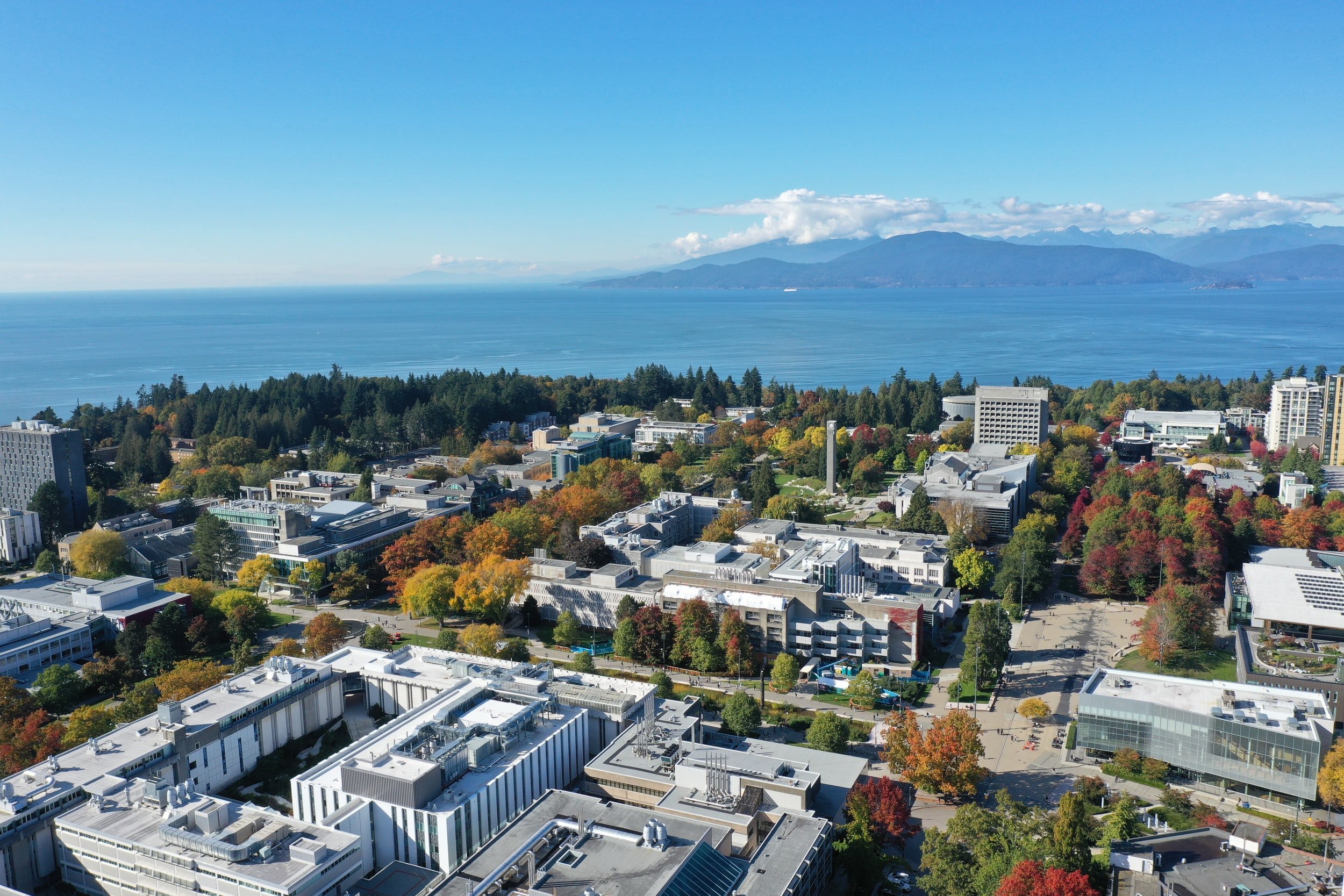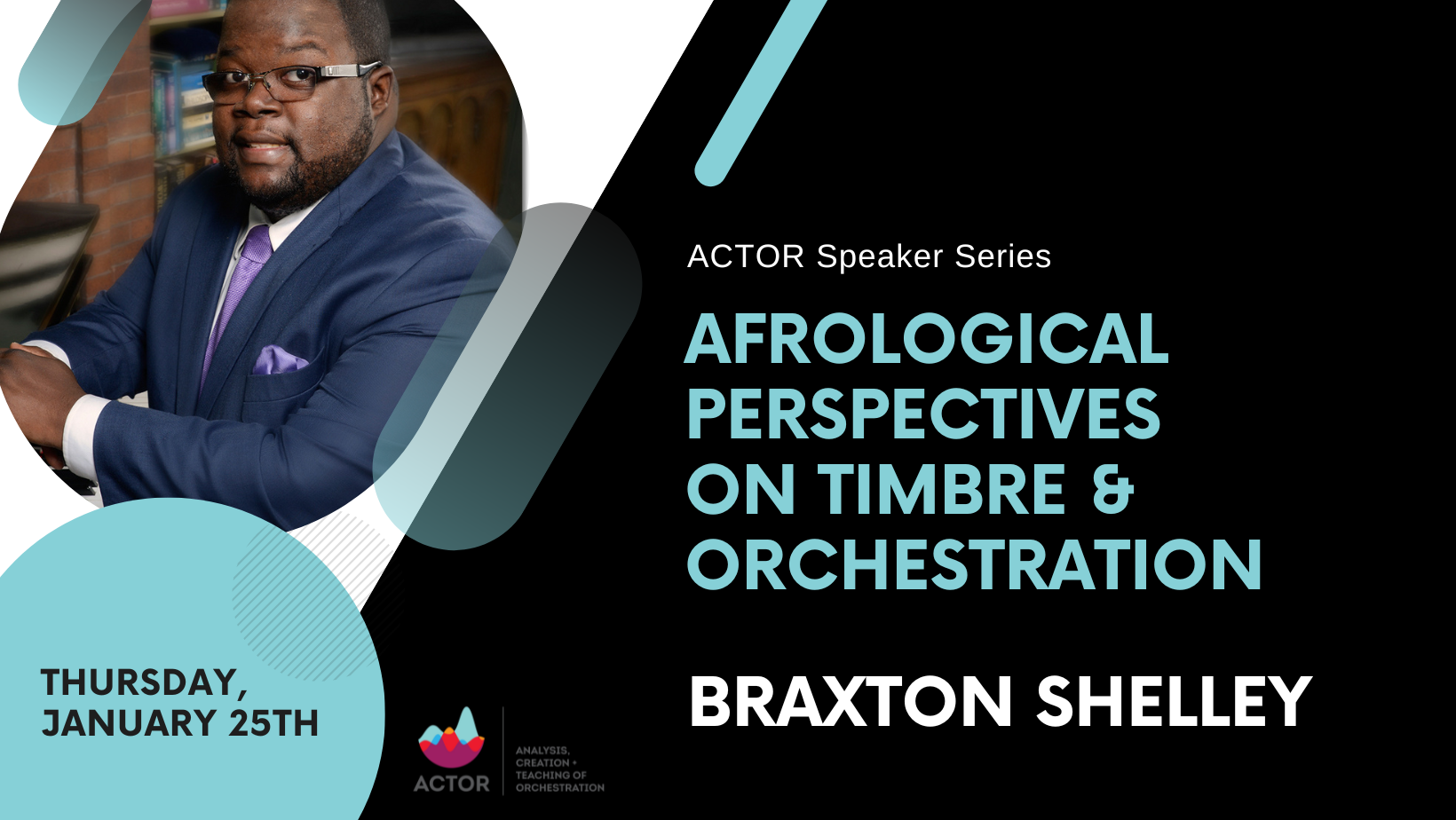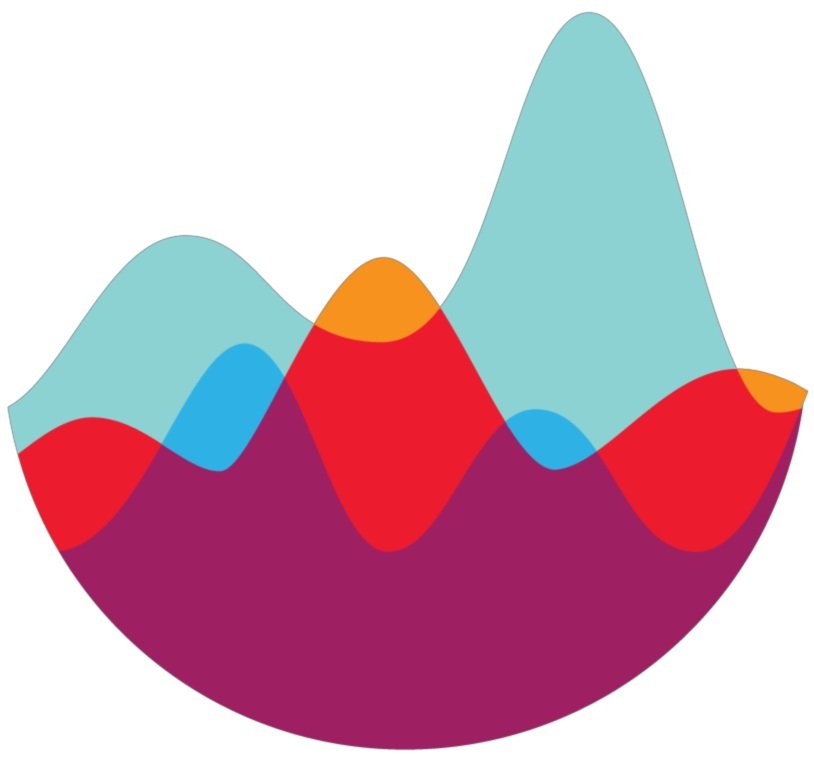
Timbre and Orchestration Summer School | Vancouver
The Analysis, Creation, and Teaching of Orchestration (ACTOR) Project is pleased to announce our second Timbre and Orchestration Summer School (TOSS2), held at the University of British Columbia’s School of Music in Vancouver, Canada, July 12–15, 2024.

ACTOR Y6 Workshop 2024 — Vancouver
The Year 6 Annual Workshop will be hosted by the School of Music of the University of British Columbia, in Vancouver, BC, Canada. It will be held in a hybrid format (online/in person). This year, the workshop will be preceded by a three-day edition of the second Timbre and Orchestration Summer School (TOSS).
The event page can be found here.

ACTOR Y7 Workshop 2025 — Geneva, Switzerland, TBC
Dates TBD/subject to change. Year 7 Workshop 2025, Geneva, Switzerland, TBC

Timbre Semantics Workgroup Meeting
Timbre Semantics Workgroup Meeting
Hello all!
The Timbre Semantics Workgroup will be holding a Zoom meeting on Thursday, May 9 at 11:00am Eastern time. You will be able to join the meeting here: https://asu.zoom.us/j/5352528724
All are welcome, whether or not you have been to a previous semantics workgroup meeting.
If you would like to share a project update, brainstorm an idea, or put a call out for collaborators (this can be as formal or as informal as you'd like), email Lindsey Reymore at lreymore@asu.edu. We’ll also be sharing informal updates and discussing future projects for the workgroup.
Hope to see you there!

Timbre and Orchestration Analysis Workgroup Meeting
The Timbre and Orchestration Analysis Workgroup will be meeting via Zoom from 10:00 to 11:30 (EDT) on April 5. All ACTOR members with an interest in music analysis are welcome to attend. The agenda for this meeting will include planning for our session at the Y6 workshop in Vancouver and lightning talks on ongoing analysis-related projects by ACTOR members—anyone who'd like to present should contact Robert Hasegawa (robert.hasegawa@mcgill.ca).
Zoom Link https://mcgill.zoom.us/j/2632309272.

CIRMMT-ACTOR Symposium on Orchestration Research VIII
ACTOR is pleased to announce the seventh ACTOR / CIRMMT Student Symposium, held as a online event on Friday, March 22nd, 12pm-2pm.

Timbre Semantics Workgroup
Timbre Semantics Workgroup
Hello all!
The Timbre Semantics Workgroup will be holding a Zoom meeting on Thursday, March 21 at 3:00pm Eastern time. You will be able to join the meeting here.
All are welcome, whether or not you have been to a previous semantics workgroup meeting.
If you would like to share a project update, brainstorm an idea, or put a call out for collaborators (this can be as formal or as informal as you'd like), email Lindsey Reymore at lreymore@asu.edu. We’ll also be sharing informal updates and discussing future projects for the workgroup.
Hope to see you there!
Porous Instruments: Synthesizers and the Circulation of Cultural Value | Jennifer Iverson (University of Chicago)
Conférence de prestige de la Faculté de musique
Jennifer Iverson (University of Chicago) | ‘Porous Instruments: Synthesizers and the Circulation of Cultural Value’
Synthesized sound pervades our experience: A futuristic sci-fi thriller opens with electronic whirrs, clicks, and hums. Top-40 radio resuscitates the sounds of the analog Moog and the digital Yamaha DX-7 synths. Teenagers gather at clubs to lose themselves in the trance-inducing loops of DJ-produced electronic dance music. Hip hop producers create sick beats from samples, layered over the mechanical thumps of drum machines like the TR-808. How did synthesized sound become so ubiquitous? Culturally speaking, why does synthesized sound matter?
Porous Instruments investigates the production, flow, and meaning of synthesized sound. I argue that electronic music technologies—synthesizers, studios, turntables—fuel the emergence of raced, gendered, and classed sounds, as well as the circulation of social capital. Synthesizers might appear to be black boxes, but they are in fact porous tools for self-fashioning: users constantly intervene with new design affordances, hacks, and off-label (mis)uses. As listeners encounter new synthesized sounds, they navigate a continuum from novelty to ubiquity, ever-inventing new meanings for the electronic sounds that swirl around them. This talk works through several examples, from TPain to Janelle Monae, from Wendy Carlos to J Dilla, and from Deniece Williams to John Chowning, showing how cultural value accrues to synthesized sound. I attend to the outward-moving processes of mobility and circulation, as well as the inward-moving processes of subcultural definition, as I analyze how synthesized sounds flow through several different instruments. Porous instruments mediate the social synthesis of identity, prestige, and cultural value.
Jennifer Iverson is a scholar of electronic music, sound studies, and disability studies. She is an Associate Professor of Music and the Humanities at the University of Chicago. She is currently writing a book titled Porous Instruments: Synthesizers and the Circulation of Cultural Value, which explores the complex histories and (mis)uses of synthesizers such as the vocoder, Moog, the DX7, and the TR-808. Her first book is Electronic Inspirations: Technologies of the Cold War Musical Avant-Garde (Oxford University Press, 2019).
Analyzing Heterophony: Theory, Perception, and Performance | Jonathan De Souza (Western University)
Analyzing Heterophony: Theory, Perception, and Performance | Jonathan De Souza (Western University)
Dans le cadre du projet « Hétérophonie » (CRSH) dirigé par Jonathan Goldman
Jonathan De Souza holds a PhD in music theory and history from the University of Chicago, an MMus from Royal Holloway, University of London, and a BMus from Western University. He joined the faculty at Western in 2013.
De Souza’s research combines music theory, cognitive science, and philosophy. It examines the interplay of technology and technique in both classical and popular repertoire. His book, Music at Hand: Instruments, Bodies, and Cognition, asks how instruments affect music’s sounding organization and players’ experience. De Souza often collaborates across disciplines, and he is an Associate Member at the Brain and Mind Institute.
At Western, De Souza teaches a range of undergraduate theory courses. Recent graduate courses have explored the history of music theory and science, phenomenological aspects of music analysis, and music theory pedagogy. From 2017–2019, he served as the director for Music, Cognition, and the Brain, an initiative at Western that brings together faculty members and graduate students from music theory and music education, cognitive neuroscience, audiology, and related fields.

CIRMMT Spatial Audio and Immersive Sound Workshop
CIRMMT Spatial Audio and Immersive Sound Workshop
We are eager to share our first CIRMMT RA4 event in 2024, on February 23rd.
The CIRMMT Spatial Audio and Immersive Sound Workshop will bring together experts from across the CIRMMT community, including students, as well as industry partners to cover various aspects of Spatial Audio and 3D Immersive Sound.
Description:
The Workshop will consist of a full day of lectures on several topics relevant to the core themes of Spatial Audio and 3D sound. Besides, there will be a variety of practical demonstrations ranging between an open hardware design for a new multidirectional loudspeaker array for spatial sound reproduction, 3D Ambisonic recordings including live demos with composers/performers with the possibility to listen to the resulting recordings immediately afterwards, as well as listening sessions of intricate multichannel music recordings in 7.1.4. Dolby Atmos in the immersive sound labs.
The workshop will consist of lectures on spatial audio in the morning and activities, performances, and demonstrations in the afternoon.
Spatial Audio Workshop Details
Date: February 23rd, 2024
Time: 9:00 AM - 5:00 PM
Location: A-832, MMR and the immersive labs in -2 (527 Sherbrooke O. Montreal, QC)
Seating is limited and registered attendees will have priority.
Nous sommes impatients de vous convier à notre premier événement de l’AR4 en 2024, qui se tiendra le 23 février.
L’atelier « CIRMMT Spatial Audio and Immersive Sound » rassemblera des experts de toute la communauté du CIRMMT, incluant étudiants et partenaires de l’industrie, pour explorer divers aspects de l’audio spatial et du son immersif 3D.
Description:
L’atelier offrira une journée complète de conférences couvrant une multitude de sujets pertinents dans les domaines de l’audio spatial et du son 3 D. En plus des présentations, les participants auront l’opportunité d’assister à diverses démonstrations pratiques. Ces démonstrations incluront la conception d’un dispositif innovant pour un ensemble de haut-parleurs multidirectionnels, une session d’enregistrement ambisonique 3D avec des démonstrations en direct par des compositeurs et interprètes, suivie de l’écoute immédiate des enregistrements réalisés, ainsi que des sessions d’écoute de musique multicanal dans une version Dolby Atmos 7.1.4 dans nos laboratoires sonores immersifs.
L’atelier débutera par des conférences sur l’audio spatial le matin et se poursuivra avec des activités, performances et démonstrations l’après-midi.
Détails de l’atelier
Date : 23 février 2024
Heure : 9 h - 17 h
Lieu : A-832, MMR, les laboratoires immersifs du -2 (527 rue Sherbrooke O. Montréal, QC, H3A 1E3)
Les places sont limitées et les participants inscrits seront prioritaires.

Analysis Workgroup Meeting
Hello ACTORians!
Our Analysis Workgroup will hold its next meeting via Zoom on Friday, January 26, 11:30-13:00 ET. All interested ACTOR members are welcome to join us, whether or not they've been to meetings of this group before. https://mcgill.zoom.us/j/2632309272
Workgroup participants are welcome to bring topics for discussion, including any ongoing or new projects involving music analysis and timbre/orchestration. This session will include an update on the analysis of our CORE (composer-performer research ensemble) pieces, including the use of the OrchView application for annotation and data coding, plus plans for an issue of the Revue Musicale OICRM on CORE.
Looking forward to Friday the 26! Feel free to get in touch if you have any questions.
All the best,
Bob

Approche collaborative de la création musicale : Processus de recherche compositionnelle et d’analyse autour du projet EROC3
Approche collaborative de la création musicale : Processus de recherche compositionnelle et d’analyse autour du projet EROC3
Bonjour à toute la communauté,
Cette semaine, le Colloquium d'études supérieures en composition et création sonore a le plaisir de recevoir le tandem composé de Simon Grégorcic et Matthieu Galliker, qui viendra faire une présentation à la Faculté de musique, ce jeudi 25 janvier de 12h30 à 14h au B-521. L'entrée est libre! Vous êtes les bienvenu·es!
Approche collaborative de la création musicale : Processus de recherche compositionnelle et d’analyse autour du projet EROC3
Notre étude se penche sur le cas de la création d’Accords secrets pour sept instruments et électronique de Simon Grégorcic. S'inscrivant dans le cadre d'un séminaire associé à la troisième édition du projet Ensemble de recherche en orchestration contemporaine (EROC3) du regroupement scientifique Analysis, Creation, and Teaching Timbre and Orchestration (ACTOR), cette collaboration a réuni une équipe de sept étudiant·e·s en interprétation, Matthieu Galliker (musicologie) et Simon Grégorcic (composition) pour réfléchir, expérimenter et mettre en œuvre des problématiques liées au timbre et à l’orchestration, à travers un processus participatif de création ayant abouti sur un concert en avril 2023. Ce processus a rapidement été canalisé autour des idées de paysage sonore et d’espace musical. Sur les suggestions de chaque membre à propos d'enjeux poétiques et techniques (modes de jeux instrumentaux, résonance et spatialisation, écriture instrumentale, technologie), l'œuvre a progressivement pris forme pour aboutir à Accords secrets. Tout au long de cette collaboration, un suivi musicologique a été réalisé afin de rendre compte des stratégies de création qui ont été empruntées. Notamment guidée à travers les concepts d'« atelier » et d' « espace », la présente communication visera à montrer ce contexte de travail, ses enjeux et limites et les mettra en perspective à l'aune d’une analyse de la pièce pour en faire ressortir le parcours collaboratif.
—
Après une formation de pianiste au Conservatoire de Versailles dans la classe de François Chaplin, Simon Grégorcic entame en France une carrière de pianiste accompagnateur et de professeur de musique. À partir de 2014 il poursuit une formation en composition instrumentale au Conservatoire de musique de Montréal, et poursuit actuellement un doctorat à l’Université de Montréal sous la direction de Caroline Traube et Jimmie LeBlanc. Il a collaboré dans des projets divers avec l’Ensemble Contemporain de Montréal (Véronique Lacroix), L’Orchestre symphonique de Montréal (Kent Nagano), Le Winnipeg Symphony Orchestra (Julian Pellicano), l’Orchestre de la francophonie (Simon Rivard) entre autres…
—
Après des études en musicologie et histoire du théâtre musical ainsi qu’en histoire de l’art effectuées à l’Université de Fribourg en Suisse, Matthieu Galliker entreprend en 2022 une thèse de doctorat à la Faculté de musique de l’Université de Montréal, portant sur l’imitation des chants d’oiseaux dans la musique humaine de 1950 à nos jours. Membre de l’Observatoire interdisciplinaire de création et de recherche en musique (OICRM), du regroupement Analysis, Creation, and Teaching Timbre and Orchestration (ACTOR) et du Centre for Interdisciplinary Research in Music Media and Technology (CIRMMT), ses centres d’intérêt s’étendent de la zoomusicologie – notamment à propos des relations entre cultures humaines et non humaines – à la sémiologie de la musique, et comprennent une attention particulière à l’intégration de réflexions touchant à la fois au processus compositionnel et à la perception de la musique.

Afrological Perspectives on Timbre & Orchestration | Braxton Shelley
Minister, musician, and musicologist Braxton D. Shelley is a tenured associate professor of music, of sacred music, and of divinity in the Department of Music, the Institute of Sacred Music, and Yale's Divinity School. A musicologist who specializes in African American popular music, his research and critical interests, while especially focused on African American gospel performance, extend into media studies, sound studies, phenomenology, homiletics, and theology. Shelley is the author of Healing for the Soul: Richard Smallwood, the Vamp, and the Gospel Imagination as well as the forthcoming An Eternal Pitch: Bishop G.E. Patterson and the Afterlives of Ecstasy. His research has received considerable recognition including the Alfred Einstein Prize, Paul A. Pisk Prize, the Jaap Kunst Prize, and the Adam Krims Award. He received his Ph.D. in the History and Theory of Music at the University of Chicago.

Timbre Geeks Networking (TGN) Event
ACTOR's Training and Mentoring Committee is pleased to announce our annual Timbre Geeks Networking (TGN) event, which will be held online on January 19, 2024, from 12h-14h EST. This year's TGN is slightly different: we invite any ACTOR student who is interested in applying for the Y6 Student Presentation Award (https://www.actorproject.org/funding/student-workshop-presentations) to deliver a lightning talk on their proposed project. Fellow students and members of TMC will offer feedback on each talk in service of helping students develop competitive proposals for the Y6 presentation award. All are welcome, but registration is required if you wish to present.

Afrological Perspective on Timbre & Orchestration | Ayò Olúrántí
Ayò Olúrántí is a composer, conductor, organist, and music theorist specializing in pre-colonial Yorùbá music and culture. Equally fluent in the fields of production and computer technology, he is also an active member of the digital and virtual pipe organ community. His cross-cultural approaches to composition and scholarship have earned him considerable international attention. He has performed and composed in Nigeria, the UK, the USA, South Africa, and Germany. Olúrántí is the recipient of numerous prestigious awards including the Morehouse College Sub-Sahara Africa Commission Award, Andrew Mellon Pre-Doctoral Fellowship, and was the winner of the Donald Sutherland Endowment Fund Composition Competition. He has published research on tonality of African languages, polyrhythm in African pianism, intercultural music composition, and orality as a compositional technique. Olúrántí received his Ph.D. in Composition & Theory from the University of Pittsburgh.

The Timbre of Early Blackface in the Making of (Black) Americana | Matthew D. Morrison
This talk will consider how the timbre of string band music has been racialized through the legacy of blackface, while recovering some of the performed histories (past and present) of Black string band musicians.

CIRMMT-ACTOR Symposium on Orchestration Research VII
ACTOR is pleased to announce the seventh ACTOR / CIRMMT Student Symposium, held as a hybrid event on Friday, October 20th, 12pm-2pm (Eastern), A-832, Wirth Music Building (McGill Schulich School of Music). The four speakers, all ACTOR members, each presented posters at the TIMBRE 2023 Conference in Thessaloniki in July.

How the cello became a vehicle for arranging Haitian songs | Leyla McCalla
Combining original compositions and traditional Haitian tunes with historical broadcasts and contemporary interviews, Leyla McCalla’s remarkable new album, Breaking The Thermometer, offers an immersive sonic journey through 50 years of racial, social, and political unrest as it explores the legacy of Radio Haiti—the first radio station to report in Haitian Kreyòl, the voice of the people—and the journalists who risked their lives to broadcast it.

Designing and Delivering Effective Research Presentations Workshop
ACTOR’s Training and Mentoring Committee will host a workshop on Designing and Delivering Effective Research Presentations. Aimed at graduate students and early-career scholars, this event features as guest speakers ACTOR Partners Lindsey Reymore (Arizona State University) and Eliot Britton (University of Toronto) as well as Mithura Sanmugalingam (McGill University Teaching and Learning Services).

The 3rd International Conference on Timbre
The 3rd International Conference on Timbre
10–12 July 2023
Including the first ever Timbre and Orchestration Summer School 8–12 July 2023 — a synergy with the ACTOR Project
Location: Thessaloniki, Greece
Hosted by the School of Music Studies and the Sound & Music Technology Lab at the Artistotle University of Thessaloniki
https://timbreconference.org/timbre2023/
About
Timbre poses multifaceted research questions across the scientific spectrum, from hearing and music to psychology and neuroscience, to acoustics and artificial intelligence. The triennial International Conference on Timbre brings together a cross-disciplinary community of scholars, researchers, and practitioners interested in timbre, and provides a joint forum for exchanging novel insights and forging collaborations across disciplines to help address challenges in our understanding of timbre from empirical, theoretical, and computational perspectives.
Timbre 2023 will feature a program of new research and work in progress, panel sessions and tutorials, headlined by keynote talks discussing timbre from ‘unexpected’ perspectives: Nina Sun Eidsheim (UCLA) on timbre and vibration, Makis Solomos (Paris 8) on timbre and listening, Charles Spence (Oxford) on timbre and crossmodality, and Jesse Engel (Google, likely remote) on timbre and artificial intelligence. In foregrounding the interdisciplinarity of timbre and its application as an important parameter in orchestration, the ACTOR Timbre and Orchestration Summer School will engage with current perspectives on acoustics, analysis, composition, perception, semantics, and voice.

Timbre and Orchestration Summer School
We are pleased to announce that the first ever Summer School on timbre and orchestration organized by ACTOR. This event is open to all, not just members of ACTOR, and no pre-existing knowledge of the topics is required.

Concert « Hommage à King Crimson »
FraKCtal se replonge dans les albums de King Crimson sortis en 1973 et 1974. De Lark’s Tongues in Aspic à Starless en passant par Fracture, FraKCtal rend hommage à ce groupe fondateur du rock progressif pour célébrer le cinquantenaire de leur formation.


Voice Timbre Group Meeting
Hi All! The Voice Timbre Group will be meeting on Monday 29 May at 11am EST. We’d like to catch up, hear about ongoing projects, and decide how to structure our session at Y5.

Composer-performer Orchestration Research Ensembles (CORE) Workgroup Meeting
CORE workgroup meeting on Monday May 29 at 11:00am EDT.

Concert du séminaire « Composer, interpréter et analyser l’orchestration contemporaine »
Concert du séminaire « Composer, interpréter et analyser l’orchestration contemporaine » et présentation des projets de l'Ensemble de recherche en orchestration contemporaine — EROC 3 (2022-2023) à l’Université de Montréal

FluCoMa workshop
On April 14th, the FluCoMa Workshop will take place at CIRMMT in collaboration with the ACTOR project and the support of composer Pierre Alexandre Tremblay, one of the developers of the library. The aim of the workshop is to bring together creative practitioners currently working with FluCoMa and to exchange ideas in a constructive and collegial environment in order to learn about different approaches and uses of the library through the presentation of ongoing projects. Participants can apply to present their projects, to address some potential problems or issues, and find solutions and alternatives.

Afro Caribbean Music: An International Impact on Culture and Aesthetic for Ensembles | Joel LaRue Smith
The Sub-Saharan Africa/Diaspora Subgroup of the Analysis, Creation and Teaching of Orchestration (ACTOR) project and the Centre for Interdisciplinary Research in Music Media and Technology (CIRMMT) invite all for the sixth talk of the Speaker Series: Afrological Perspectives on Timbre and Orchestration. Presented by Joel Smith (Tufts University).

Zhōng | Prof. Claus-Steffen Mahnkopf
The East Asian Music subgroup will organize a finishing guest talk on Mar. 23rd for this term, inviting German composer, Prof. Claus-Steffen Mahnkopf (Hochschule für Musik und Theater “Felix Mendelssohn Bartholdy” Leipzig) to talk about his recent composition “Zhōng” (2020) scored for traditional Chinese ensemble, a piece with extensive exploration on extended timbral possibility of different Chinese instruments and on notational practice.

CIRMMT-ACTOR Symposium on Orchestration Research | 6th
The Analysis, Creation, and Teaching of Orchestration (ACTOR) Project and the Centre for Interdisciplinary Research in Music Media and Technology (CIRMMT) will be co-hosting a hybrid symposium on orchestration research.
Timbrenauts: Creative Explorations in Timbre Space
Speech as Timbre Models for Orchestration – a Comparative Study Between Cantonese and Québécois French
Masque de Fer
An investigation of choral blending through soundfield capture, acoustic evaluation, and perceptual analysis methods

Orchestration: a functional approach to sound organization in African music | Andile Khumalo
The Sub-Saharan Africa/Diaspora Subgroup of the Analysis, Creation and Teaching of Orchestration (ACTOR) project and the Centre for Interdisciplinary Research in Music Media and Technology (CIRMMT) invite all for the fifth talk of the Speaker Series: Afrological Perspectives on Timbre and Orchestration. Presented by Andile Khumalo (University of the Witwatersrand, Johannesburg).

Timbre Semantics Meeting
The Timbre Semantics Workgroup will be holding a meeting on Zoom on February 27 at 10am EST. All ACTOR members are welcome to join, whether or not you have been to previous semantics events!

“Do You Hear What I Hear?”: An Afrological Approach to the Study of Sonic Representations from the African American Band Tradition | Marvin McNeill
The Sub-Saharan Africa/Diaspora Subgroup of the Analysis, Creation and Teaching of Orchestration (ACTOR) project and the Centre for Interdisciplinary Research in Music Media and Technology (CIRMMT) invite all for the fourth talk of the Speaker Series: Afrological Perspectives on Timbre and Orchestration. Presented by Marvin McNeill (Emory University)


